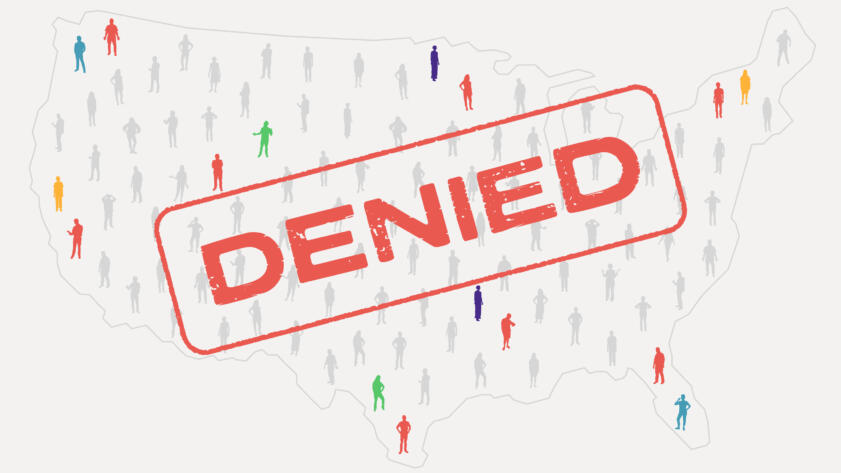On the heels of a major effort to address redlining announced by the Biden administration this fall, legislators and regulators across the country are calling for additional scrutiny, including some that represent areas with vast lending disparities between White applicants and applicants of color.
“To counteract the gap in lending rates, we must put forth legislative solutions to combat these alarming disparities on the city, state, and federal level,” Rep. Ilhan Omar (D-MN) said in a statement. “This gap exists due to the decades of racism and discrimination embedded in policy decisions that fundamentally hurt people of color.”

Denied
The Secret Bias Hidden in Mortgage-Approval Algorithms
Even accounting for factors lenders said would explain disparities, people of color are denied mortgages at significantly higher rates than White people
Her reaction came in response to The Markup’s recent investigation, which found that people of color are significantly more likely to be denied a mortgage than White people with similar financial qualifications. Nationally, lenders were 80 percent more likely to deny Black applicants than similarly qualified White applicants, 70 percent more likely to deny Native American applicants, 50 percent more likely to deny Asian/Pacific Islander applicants, and 40 percent more likely to deny Latino applicants.
The Markup also identified 89 metro areas with stark lending disparities spanning nearly every region of the country, from Nashville, Tenn., and Waco, Texas, to New York City and Los Angeles. One of the worst was in Omar’s home state of Minnesota. Lenders were about 100 percent more likely to deny Black and Native American applicants in the Minneapolis metro area than White applicants there. Mortgage lenders were about 50 percent more likely to deny Latino and 70 percent more likely to deny Asian/Pacific Islander applicants there. It was the only metro area in The Markup’s analysis where all four racial and ethnic groups were more likely to be denied home loans.
Minnesota attorney general Keith Ellison said that lenders need to examine their lending standards and “cannot rely on the algorithms and approval formulas they’ve been using.”
“It is clear that their criteria and policies, intentionally or not, result in serious disparities in lending patterns,” he wrote in an email. “Lenders who do not do so should not be surprised if they are investigated for violating state and federal laws, like the Fair Housing Act.”
The Richmond, Va., metro area had particularly high lending disparities for people of color. Black, Latino, and Asian/Pacific Islander applicants were all more than two-and-a-half times more likely than White applicants to be denied a mortgage.
“It’s appalling—though not surprising—that aspiring Black and brown homebuyers are still haunted by the kind of discriminatory housing practices that prevailed in this nation for decades,” Sen. Mark Warner (D-VA) said in a statement.
Rep. André Carson (D-IN) called The Markup’s findings “disheartening, but not surprising.”
We need federal policies that not only hold discriminatory mortgage lenders accountable, but also reduce their incentive to engage in these practices in the first place.
Rep. André Carson
“For many years, there have been systemic, coordinated efforts to deny home ownership to minorities and deny them that most essential American dream,” he said. “Today, we need federal policies that not only hold discriminatory mortgage lenders accountable, but also reduce their incentive to engage in these practices in the first place.”
Industry representatives at the time criticized The Markup’s investigation, saying that the public data couldn’t be used to draw conclusions because it did not include credit scores, which the government collects but are not public. The Mortgage Bankers Association and American Bankers Association also said the scope of The Markup’s analysis was too narrow and should have included government-insured loans rather than focus on conventional loans.
More than 160 news outlets and publications carried The Markup’s original story, including The Associated Press, The Washington Post, and Bloomberg. Several, including The Post and Courier, NBC News affiliate 9News in Denver, and The Des Moines Register, used The Markup’s findings and analysis as a basis for their own stories.
The U.S. Department of Justice, Consumer Financial Protection Bureau, and Office of the Comptroller of the Currency launched their “Combating Redlining Initiative” in October, citing The Markup’s findings in their announcement.
This new initiative is in stark contrast to how the previous administration handled redlining cases. The number of these cases referred to the Department of Justice dropped precipitously since 2010, from about 25 cases that year to fewer than 10 cases in 2019.
At a hearing ushering in CFPB director Rohit Chopra, Sen. Sherrod Brown (D-OH), who chairs the Senate’s banking committee, said algorithmic bias “risks reinstating Jim Crow in a new, high-tech form.”
Biases in technology and algorithms are the newest manifestation of housing discrimination.
Sen. Sherrod Brown
“Biases in technology and algorithms are the newest manifestation of housing discrimination,” he said in a statement to The Markup. “Regulators and Congress must ensure that our fair housing and fair lending laws are fully enforced to root out discrimination in all its forms.”
In Brown’s home state, The Markup found, Black, Latino, and Asian/Pacific Islander applicants in the Cincinnati metro area were all at least 100 percent more likely to be denied than White applicants.
Fannie Mae and Freddie Mac, two quasi-governmental agencies that buy half of the mortgages in the country, announced changes to their underwriting software this year after we contacted them and asked about their algorithms. They both will start incorporating on-time rent payments into their algorithms to allow more people to qualify for homeownership.
Michele Rayner, a Democratic state representative in Florida, said the issue is a “huge priority” for her. She tasked her staff with reaching out to several of the companies mentioned in The Markup’s investigation about how they conduct business in Florida. She sits on the state house’s banking and insurance legislative subcommittee.
To me this goes to the heart of self-determination.
Florida state representative Michele Rayner
“To me this issue just goes to the heart of self-determination,” Rayner said. “You’re denying people who would be otherwise eligible for a home based on an algorithm somehow.”
Florida had the highest number of metro areas—nine—with statistically significant differences in mortgages given to White applicants versus applicants of color. California had eight, the second-highest.
California’s attorney general, Rob Bonta, recently said the California Department of Justice’s Housing Strike Force and the new Racial Justice Bureau would be taking on housing issues, including examining “mortgage servicing issues.”
Nina Sheridan, press secretary for the California Attorney General’s Office, declined to comment on specific enforcement actions, saying, “In terms of any potential future actions, stay tuned!”





